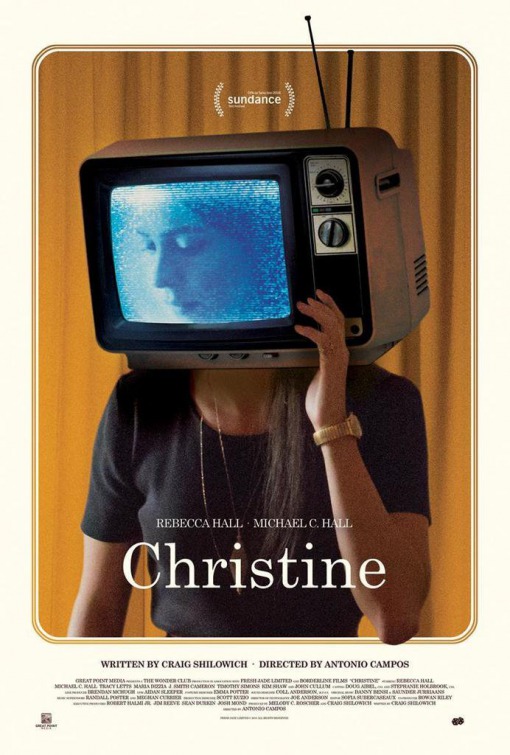Movie Breakdown: Christine (Noah)
Pre-Screening Stance:
I like Rebecca Hall. I like small stories about crazy events. I think I may like this movie.
Post-Screening Ramble:
The center of Antonio Campos’ film, Christine, is, of course, local Sarasota television news reporter Christine Chubbuck (Rebecca Hall). In 1974, Chubbuck, in a downward spiral of depression and paranoia, shot herself live on air, implying that she was sticking to the station’s policy of “if it bleeds, it leads.” Campos’ film is a deep character study of a woman losing control, a slow burn of a film that takes place over two weeks, as the audience watches Chubbuck go from eccentric brain, to the maddening circles of her mental illness. Campos never pushes too hard to show Chubbuck’s slide off the grid, instead he sets a beautiful, period-specific-1970s stage, populates the cast with strong character actors and then throws Rebecca Hall front and center. And she absolutely owns it. This movie rests on the shoulders of Hall and though at times in her career she’s been typecast into films that ask for an awkward but attractive character (Chubbuck also fits this role), here we see the true range of Hall’s ability. Her Chubbuck isn’t stereotypically crazy, but instead a combination of tics and twitches and subtle mental breakdowns that pull her further and further down a hellish road in a vehicle made of her own twisted logic. Yes, Chubbuck was standing on the border of sanity, but her coping mechanisms – a hard, brassy shell – made her just about charming. Hall manages to imbue the character with this smart, hard-edged strength, but the vulnerability at the heart of the character gives the audience a front row seat to watch the cracks in the armor appear. A scene with Chubbuck and her mother (J. Smith-Cameron) in which Chubbuck harangues her mother for finding a new boyfriend before breaking down is especially touching. Chubbuck, an intelligent woman cut off at the knees by mental illness, was very much two-sided in her interactions with her mother, and Hall is able to showcase this – the toughness and the distancing falling away to reveal the broken child at the heart of the character. It is a chilling and amazing performance, the equivalent of watching a train derail in slo-motion. And though Hall’s performance makes the film, Campos’ selection of recognizable but not scene-stealing co-stars gives Hall the foundation to push off of. Her scenes with Michael C. Hall’s George (an anchor) are both sweet and awkward, but also telling of the heart of the story – there is a connection in our manners of coping. George reaches out to Chubbuck with a bizarre form of group therapy, because he worries about her, and as the film progresses each character, in their own way, shows their concern for Chubbuck, but Chubbuck can’t open herself up, she’s already too deep. And in the aftermath of Chubbuck’s suicide, as the small world of a local news station spins out of control, we see the crew’s own methods of coping – ranting, shock, ice cream – come to the fore, as if Campos is showing that deep down in our dark parts, we’re all a little crazy, and we all, to varying degrees of success, find our own ways of coping. Christine Chubbuck could not, and Campos’ telling of her story is small, poignant and beautiful.
One Last Thought:
I can’t imagine what the small market of Sarasota, Florida was put through to see Christine Chubbuck shoot herself on air. Absolutely nuts.


